Chapter 41: Rumble in the Jungle (1632-1636)
Upon the annexation of Vinland into the Empire, the northern administration would come to incorporate the former territories. Due to the territorial size within the north and the isolation between communities that became more and more distinguishable the further north they were located, Imperial bureaucracy within Vinland was largely focused on pacification of the north. Governors of the northern states, especially in the former Norse homelands of Markland and Helluland, were Christians. More influential governors within the states worked along the noble classes in the region to allow as smooth of a transition as possible, but didn’t let political opportunities get in the way of bringing their own authority over that of the State.
With Norse worship having effectively been criminalized by the Imperial Senate, opportunistic governors within Vinland decided to take this further. Non-Christians and Norse followers started to be completely excluded within day to day life, where governors purposely strangled their opportunities for careers. Discrimination would occur over northern traders where former Norse trading companies were forced to be shut down by matters of the state and their assets transfer to a growing imperial monopoly. Norse temples were closed down, demolished or burnt down by local authorities. Norse worshipers were being marginalized from a poorer life, the only solace within the dwindling followers of their ancestors were among the farmers, who were typically left alone by the Empire.
Despite that, it didn’t stop the decline of the Norse faith within the North, who had started to become more and more christian overtime due to the influence of the Empire and the faith personally appealing to many former Norse worshipers. As administration was concentrated onto the north, the Imperial government was about to concentrate completely onto the south, eager to deal with an old rival of theirs.
Helene I Spartakon (1592-1635). The cruel and malevolent Kyriarchos of Spartania, she rules with absolute control over the country much to her subjects displeasure.
The Kingdom of Spartania, having origins from the Empire itself, ruled a kingdom from the northern deserts to the southern jungles. It’s legendary leader, Leonidas, was closely related to the Palaiologos dynasty of Elysia. Despite the connection between the two royal families, Spartan distrust and egotistical ambition soon overshadowed what was once a sense of friendship between their relative nations. As the decades past, as Spartania grew bigger from brutal conquests against Barbaroi within the region, their government became more and more hostile to the Imperial government. From jealousy, to being landlocked by its larger and wealthier cousin, Spartania was a nation with a deep disliking to Elysia but remained isolationist and kept interaction with the Empire to an absolute minimum.

Due to the extremely close blood ties between the monarchy of Elysia and Spartania, the Empire had a perfect reason behind claiming the throne of Spartania. Aside from dynastic matters, Spartania was a cultural cousin to the Elysians and sat in the perfect geographic position. Emperor Andronikos would openly declare his ambition to unite the two crowns and centralise the entirety of the continent of Elysium under Imperial rule.
War would be declared on August 3rd 1633, and the Imperial army stormed from the northern border with force. With a small army focusing on creating a two front war to the south, tens of thousands of Tagmata would cross the northern desert and easily break through the weak northern lines.
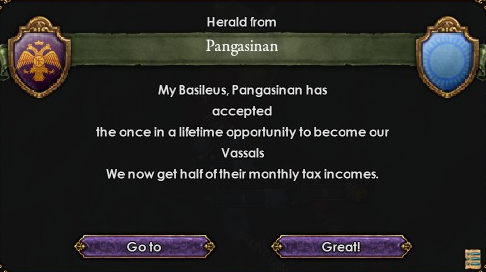
In the Maniolas, relationships between the Pangasinan and the Empire had continued to blossom. Elysia would start to work alongside the kingdom, bringing them closely under their influence and assisting the Kingdom with whatever they needed. Alliances were established, gifts and pleasantries were exchanged, and Maniolian Kingdom would swiftly fall in love with the foreign Elysians. In time, their King was encouraged by his own court to convert to Christianity, and the Empire made Pangasinan an offer they could not refuse. Become a Vassal of the Empire and fully convert to Christianity, and Elysia would give them the entire archipelago. Immediately, the king accepted the offer, establishing a long relationship within the realm.
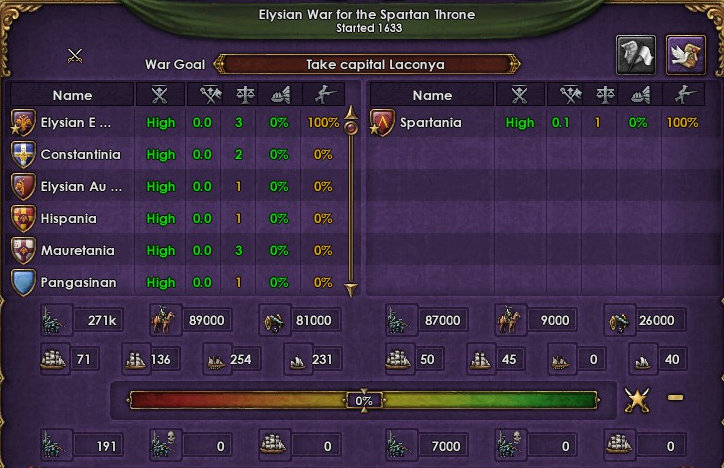
Known as the Unification War in Elysium, the capabilities between the Imperial Armies and Spartan ‘might’ was completely different. Despite the Spartans claiming to have the better military, it was claimed during a time before the Elysian armies transformed into what they are now. Times had changed, and the Empire now held the advantage over their southern rival in both numbers and capability.
As firearms had become more common within the Elysian troops, old regiments of elite soliders no longer filled the same function as skilled sharpshooters and pioneers. While they had done much to develop the Imperial army, they would be dispersed among the other regiments to bring the Spartans to kneel.
In just a few months, the Empire had made gains within the north and brought a large amount of enemy territory under occupation in the north. Alarmed by losing against what should have been a weaker opponent, Spartan leadership was incredibly displeased and sent their forces to the north to attempt to break Imperial lines directly, sacrificing the south in an attempt to relieve pressures in the north.
Spartan soldiers, in what would be an attempt to liberate the north, would make a terrible mistake. Having completely underestimated Elysia command and troops, the would become quickly broken and disorganized in a place which would become a symbol of their greatest defeat, Leiondiopolis.
With the Elysians soon being reinforced by a neighboring army, Imperial military supremacy was more then prevalent as the Elysians achieved little losses during the battle. Spartania would be completely decimated at Leiondiopolis, being completely humiliated by an enemy that was previously perceived as weak. Morale among the Spartans after the battle would plummet, and panic started to spread among their own infantry. The image of Spartan might and supremacy, a sense of national pride among the Kingdom, was utterly shattered.
The Battle of Leiondiopolis, painted by an Spartanian painter during the 17th century. The Battle would be regarded as the one the destroyer of Spartanian 'supremacy'.
The crushing victory at Leiondiopolis would free mobility among the Elysian troops, able to expose the entirety of the mountainous central region of Spartania and placed Tenochtitlan under direct threat from the Empire. Spartania, despite the disastrous defeat, would regroup in their capital of Laconya.
After facing against the Spartan forces for a year and a half, it would not be until the middle of 1634 that the Empire would see the arrival of their exarchs from across the Atlantic. Now outmaneuvering and destroying their armies at any given opportunity, trapped Spartan forces would be forced into entrenched positions where the Elysians held a defensive advantage.
From what was once an extreme minority within Vinland had transformed into an overwhelming majority, and the Church couldn’t be happier. The Ecumenical Patriarch believed that the Norse had experienced a spiritual awakening, and that conversion rates were occurring so quickly that the Empire almost couldn't keep up. Christ had won in Vinland, and the Norse were about to fall into the annals of history.
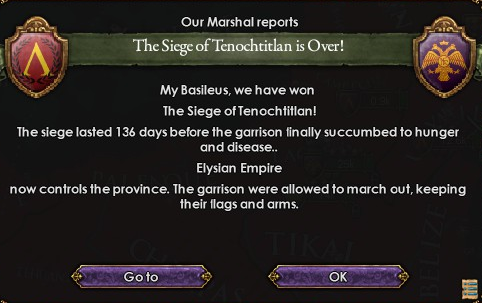
With the central portion of the Kingdom completely exposed to the Empire, the populous city of Tenochtitlan fell to Imperial troops after a lengthy period of siege. Elysian commanders were shocked to find a metropolis on an island near the shore of a great lake, and were even more surprised to see the unique blend between native and spartan architecture dotted along its buildings. Dumbfounded by the beauty of the city, the Elysian commanders and their troops understood why the Spartans had decided to rebuild the metropolis to even more spectacular levels. The sky was as blue as the water of the lake, the colors of both native and spartan art and agriculture were incredibly mesmerizing and exotic, and the nights were cold. With the city conquered by the Elysians, the commanders ordered that the city was treated with the utmost respect and care, a feeling that was shared by the troops that were mesmerized by her beauty...
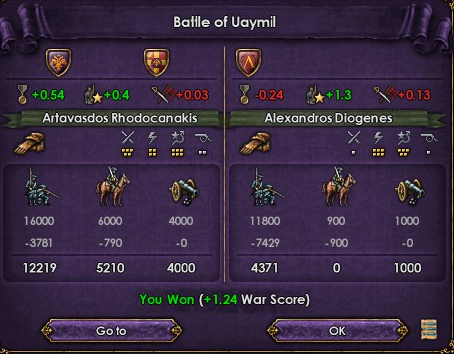
Another grand battle occurred at Uaymil, where Elysian troops outclassed the ferocious abilities of Spartania’s finest men. Uaymil, which was within several days marching distance from the capital, was one of the last sites of a serious Spartanian defeat. The path to the capital was now open, and thousands would march across the jungles to lay siege of Laconya
Emperor Romanos I Palaiologos. The Judge, Jury and Executioner.
(Ignore the 'V' part in his name. That is a bug, he is supposed to be Romanos I)
Disaster would strike at the heart of the Empire during the war. Emperor Andronikos would meet his fate at the hands of an assassin, who had managed to slip past the Epilektoi and assassinate the Emperor with a blade to the heart during what was supposed to have been a period of festivities. Andronikos would die from his fatal wounds on April 1st 1635, moments after his assassin would be caught. Never having children of his own, the line of succession would pass to his older brother, the newly crowned Romanos I of Elysia
The assassin would be captured by the Epilektoi and brutally brought to justice, where the assassin would be tortured into revealing his motives. The new Emperor Romanos would personally lead the investigation, soon discovering that the assassin was a Spartan man who was tasked by the Kyriarchos herself to kill the most powerful ruler on the planet for the reward for unimaginable wealth. Sickened by the truth, Romanos would order the immediate execution of the assassin once he got the information he needed. This would only strengthen the Empire’s resolve during the war, and Romanos’s personal vendetta against the Kyriarchos.
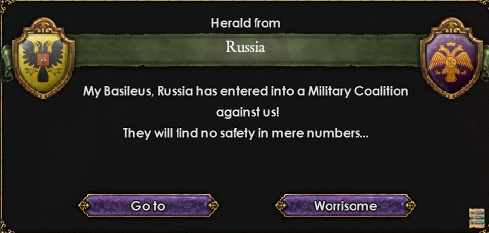
Taking advantage of the loss of an Emperor, news would come from Europe that Russia had joined a coalition against the Elysians. Despite the coalitions growing, all of its members were terrifying of going to war against the Empire following the disaster of the First Europa War. With both sides at an impasse, and coalition members being indecisive or incredibly hesitant against the Empire, it allowed Elysia to maintain the breathing room it needed to safeguard their interests in the East.
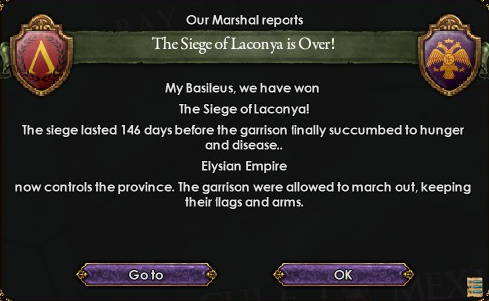
Laconya would be surrounded by the Elysians, who had emerged from the jungles within the peninsular, and would bring hellfire with them. Artillery fire, both from gunpowder cannons and specialised Greek Fire weaponry, would devastate the walls of Laconya and its defenders. The city, the largest in the region, was well prepared for an inevitable siege and took the necessary precautions to last for as long as they could. The capital was almost self sufficient on its own in terms of agriculture, as farming was encouraged behind the safety of the strong walls of the city rather than outside them, a legacy that came from the early days of the founding of Laconya as a means to defend them from the savage barbaroi in the region.
It would not be the relentless firepower from the siege that the Elysians had brought with them, but instead, it would be crop failure that would break Laconya. Despite being excellent farmers, the weather turned against the Spartans and torrential rain would ruin the crops of the city. Food shortages began to occur, and the Kyriarchos tried to maintain order within the capital and keep the news to a minimum. Once Elysian commanders had heard rumors of a food shortage, Imperial troops launched an assault on the walls of the city. Unable to maintain the defense for much longer, the strict discipline of the spartan troops gave way and they started to surrender to the Empire in exchange for their lives. Once the city began to fell, the Kyriarchos attempted to flee the city. She would be discovered hours later by Elysian forces, having discovered that she had died during her attempt to flee the capital.

The war would come to a close after the Siege of Laconya, and peace would be signed in the Spartan Palace, which had survived the bombardment. Now seen as the official leader of the Empire, Spartan succession fell to Helene’s daughter, Princess Hercuba. While her mother was seen as a wicked woman who valued Spartanian strength, Hercuba was the complete opposite. She was much more a prisoner to her mother instead of being a true Spartanian princess.
Through many many decades of arranged strategic marriages among Spartan and native nobility, the House of Spartakon was genetically completely separated from the Imperial house of Palaiologos. Emperor Romanos would visit Hercuba following the fall of the city. Rather than treat them as an enemy for the sins of their mother, Emperor Romanos would embrace Hercuba like she was his own daughter and hugged her tightly, to which Hercuba broke down in happiness. In this act of compassion, Romanos had reunited the houses. The Emperor could have done anything with the house of Spartakon, such as sentencing them to a cruel fate, instead he gave them a new opportunity in life.


Upon their victory over Spartania, the Empire would come to form a personal union with Spartania and Emperor Romanos would rule both nations. From Panama to Vinland, the New World was under the rule of the Emperor. It would take time to mend the bond between the realms, but in time, the former hostile relationship was to be turned into an unbreakable bond.
Hercuba Spartakon would surrender all claims on the Spartanian throne, and in turn, so would the remainder of her family. Emperor Romanos, out of gratitude and sensing the kindness in this young woman, would grant them a new life among the nobility of the Elysian Empire. The House of Spartakon would move to the Hesperidian Plains, wishing to distance themselves from the capital, where Hercuba and the rest of the former dynasty would happily spend her days. In time, she would fall in love with a young nobleman in the region, and she would find her happy ending in the years to come.
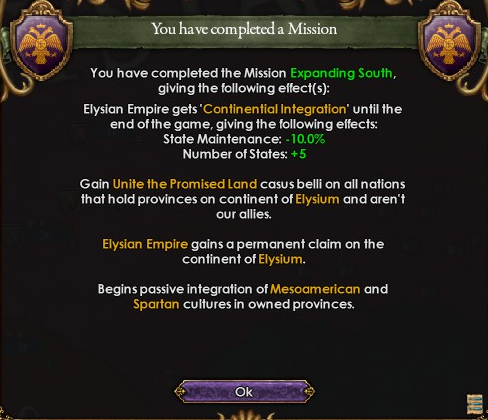
In the years since the foundation of Elysia, the Empire had grown incredibly powerful over the years, and it had come time to reintegrate the renegade Spartan Kingdom into the fold. The entire region would be brought to heel, including any remaining barbaroi tribes and kingdoms in the region. Only would it be under the complete domination of the continent of Elysium that its inhabitants would accept Imperial authority as the true rulers of the continent.
Despite the Empire securing its rule over the former Spartan kingdom, the nobility in the region had lost their power. It is within the Empire’s best interest and the will of their new subjects to regain and restore Imperial rule across the subcontinent. With the combined might of Elysia and Sparta upon them, the Empire would find interest in unleashing this combined might against the decadent Europeans.
From the furthest corners of Greenland to the tropical hell that was the Darien Gap, from the Hesperidian Fields to the Kyklandian Archipelago, the Empire had defeated all her her enemies to the south and the north. Ruling an Imperium that stretched for thousands of miles, combined with the beginnings of a tremendous population boom, there was very few who could protest against Imperial might.
It would be the Yupik, a barbaroi kingdom on the Imperial border, and an extremely isolated tribe to the far frozen north that escaped the rule of the Empire. With the enemies of the Empire now under complete Imperial rule, it was now time to turn the attention of the Empire towards the frozen north once more.
